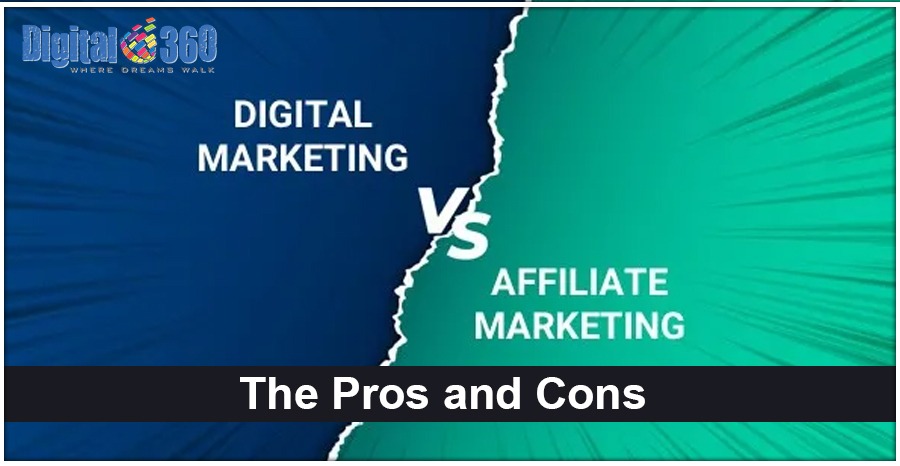
Digital Marketing and Affiliate Marketing: The Pros and Cons
In today’s digital world, businesses have several options when it comes to marketing their products or services. Two popular methods are digital marketing and affiliate marketing. Both methods have their benefits and drawbacks, and it’s important to understand them to determine which one is best for your business.
Glance at the Term of Digital Marketing and Affiliate Marketing
What is Digital Marketing?
Digital marketing involves using digital channels such as search engines, social media, email, and other platforms to promote products or services. It is a broad term that includes a variety of tactics, including search engine optimization (SEO), content marketing, social media marketing, email marketing, and more.
The Pros of Digital Marketing
One of the main advantages of digital marketing is its ability to reach a vast audience. With billions of people using the internet every day, businesses can use digital marketing to target specific demographics and reach potential customers who may not have heard of their brand before. Additionally, digital marketing allows for precise targeting, which means that you can tailor your message to a specific audience, increasing the chances of converting them into customers.
The Cons of Digital Marketing
However, digital marketing can also be costly and time-consuming. Running effective digital marketing campaigns requires a significant investment of time and resources, and it can take months or even years to see results. Additionally, digital marketing requires ongoing maintenance and optimization to ensure that your campaigns are performing at their best.
What is Affiliate Marketing?
Affiliate marketing involves partnering with other businesses or individuals to promote your products or services and earn a commission on sales. Affiliates promote your products or services through their channels, such as a website or social media account.
The Pros of Affiliate Marketing
One of the main advantages of affiliate marketing is its scalability. With affiliate marketing, businesses can reach a wider audience and increase their revenue without having to invest in additional resources or infrastructure. Additionally, because affiliates are only paid when they generate sales, businesses can ensure that they are only paying for results.
The Cons of Affiliate Marketing
However, affiliate marketing also has its drawbacks. Because affiliates are independent contractors, they may not always represent your brand in the way that you want them to. Additionally, because affiliates are motivated by commissions, they may prioritize promoting products that offer higher payouts, rather than products that are the best fit for their audience.
Which One is Right for Your Business?
In conclusion, both digital marketing and affiliate marketing have their advantages and disadvantages. While digital marketing offers the ability to reach a vast audience, it can be costly and time-consuming. On the other hand, affiliate marketing is a low-cost and low-risk strategy that can help businesses reach a wider audience and increase their revenue, but it comes with the risk of affiliates not representing your brand in the way that you want them to. Ultimately, the best strategy for your business will depend on your specific goals, budget, and target audience.
Digital360: Pioneer in Digital Marketing and Affiliate Marketing Services
For businesses aspiring to thrive in the digital realm, consider partnering with Digital 360 to harness the power of tailored digital marketing solutions. Whether it’s navigating the intricacies of social media, optimizing content for search engines, or establishing a successful affiliate marketing program, Digital 360 is dedicated to propelling your brand to new heights in the online landscape. Connect with Digital 360 today and embark on a journey to boost your online presence and achieve marketing excellence.
